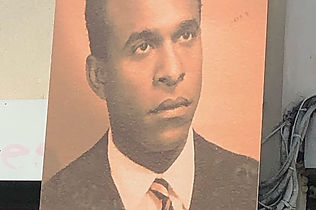Courses


Interpreting Politics and Culture
This class will examine the historic relationship between politics and culture by investigating how diverse media represent, interpret and challenge political power and social (in)justice. The syllabus is organized chronologically and thematically, and will focus on filmic responses to issues like racism, sexism, empire, human and civil rights, climate change, liberalism and globalization. Throughout the course, we will use critical theory as a tool to read the sensory grammar of culture and the role of ideology therein, while rigorously contextualizing cultural objects in twentieth and twenty-first century history. Because this is an intensive course relying on close reading practices, attendance is mandatory – but we will have a lot of fun doing the creative work of interpreting culture and politics as mutually constitutive sites of meaning-making.

Walk Like an Egyptian: Media and Myth
One of the most remarkable aspects of representations of Egypt in the United States is its enduring popularity as well as its ubiquity, with multiple groups claiming and consolidating Egypt as a both literal and symbolic place of origin. From feminist belly dancers, pop archeologists, orientalist filmmakers to Black nationalists, Egypt remains a core area of cultural imaginaries of difference, situated along a continuum of American representations that predate the republic itself. However, recent years have also seen increasing opportunities for Egyptian and MENA Americans to offer multivalent counter-discourse dedicated to more nuanced and authentic visions of Egypt. This workshop series will interview cultural producers and stakeholders to explore the opportunities and challenges of contesting preeminent representations of Egypt, while situating their work within a longer historical arc of questions of representation and equity.
![Helen Najjar, Aleyha Hussein [sic] at AAUG.jpg](https://static.wixstatic.com/media/bfcfab_7787a94b1d4e480d9b511b5b5f43346f~mv2.jpg/v1/fill/w_316,h_210,al_c,q_80,usm_0.66_1.00_0.01,enc_avif,quality_auto/Helen%20Najjar%2C%20Aleyha%20Hussein%20%5Bsic%5D%20at%20AAUG.jpg)
MENA: American Politics and Culture
Despite centuries of immigration and organizing, many Americans overlook the long and rich history of Middle Eastern and North African Americans, and the dynamic identities, cultures and resistance they have forged in diaspora. Equally importantly, methodological nationalism has often obscured different MENA diasporas as fellow travelers who have shared interconnected migrations, marginalization, segregation, languages, musics and religions both abroad and in the MENA region. This course focuses on uplifting MENA American stories and voices through an expansive archive of legislation, culture, critical theory, and academic scholarship, that articulate multiple, overlapping and sometimes distinct “Middle Easts.” Modeling an inclusive American history that foregrounds MENA Americans and our shared investments in the region, this approach emphasizes the interconnectedness of intra-and inter-ethnic politics in relation to mainstream American politics and foreign policy, thereby deepening our understanding of American history as a whole.

American Constructions of the Middle East
As reported in December 2015, Public Policy Polling showed that 30% of Republicans and 19% of Democrats supporting bombing “Agrabah,” the fictional city of Disney’s Aladdin. Among Trump supporters, the tally was even higher, as was their support for the “Muslim ban” and outlawing Islam in the US outright. How do we reconcile many Americans’ limited knowledge of the MENA region with their certainty that they must ban Muslims, bomb Agrabah, or legislate against “shariah law”? This course historicizes and interrogates various perceptions of the “Middle East” to better understand the emotional and material investments Americans hold for the region. In a moment in which expertise is uniquely devalued – and truthiness, to borrow from Stephen Colbert, seems to matter as much as fact – this course seriously considers how and why we feel so much about the Middle East. Exploring an expansive archive to include legislation, film, history, music, fiction and critical theory, the course embraces Melani McAlister’s insight that culture and foreign policy are mutually constitutive sites of meaning-making. These insights will guide mastery of material for this course, while also providing an overview of critical debates and methodologies in American Studies writ large.

MENA American Autobiography
Moustafa Bayoumi’s How Does It Feel to Be a Problem? has become one of the most commonly assigned high school and university required readings. Nonetheless, few readers or scholars have paid careful attention to the long and rich history of autobiographies by people of MENA descent in the Americas, in spite of the prominence of autobiography in Middle Eastern and European literary studies. This course aims to rectify that oversight by considering a range of autobiographical works by MENA Americans, while also interrogating autobiography as a historical archive. Moving chronologically, this course examines the varied forms and beliefs these autobiographies articulate, to foreground diaspora as an essential facet of Middle Eastern and American identities, as well as to trace changes and continuities in the Americas’ relation to the region.

Selected Topics in Global Studies: Critical Theory and Race
This course provides a solid foundation in key theorists for contemporary Humanities scholarship on race, establishing cross-disciplinary connections as well as productive tensions. By pairing a brief - though rigorous - theory excerpt with a full monograph each week, this course will hone students' ability to identify critical concepts as well as how race scholars have utilized theory. For the most part, weeks build on one another, but that does not indicate strict chronology or “progress.”
